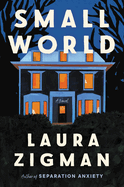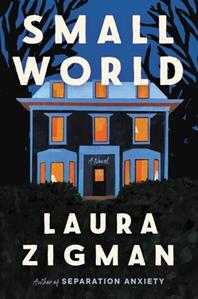
 Among the pleasures of Laura Zigman's Small World is its implicit defiance: it's a novel revolving around two middle-aged sisters who have recently been left by their husbands, and yet these women are utterly disinterested in finding new men or in fretting over the ones who discarded them. What preoccupies the sisters Mellishman is their family history--a bramble of secrets, hurts and other mainstays of the all-absorbing kin novel.
Among the pleasures of Laura Zigman's Small World is its implicit defiance: it's a novel revolving around two middle-aged sisters who have recently been left by their husbands, and yet these women are utterly disinterested in finding new men or in fretting over the ones who discarded them. What preoccupies the sisters Mellishman is their family history--a bramble of secrets, hurts and other mainstays of the all-absorbing kin novel.
Joyce Mellishman, the novel's part-time narrator, is an archivist for a Boston-area company that digitizes photographs. One winter day she's blindsided by news from her older sister Lydia, an artist in California: Lydia is moving back east after 20 years away. "The divorce is final," Lydia tells Joyce. "I'm selling the house. Maybe I'll go back to school or look into teaching. Or maybe it's just time to come home already." Joyce does the sisterly thing and invites Lydia to move temporarily into her Cambridge apartment, where the two share meals, squabble and avoid delicate subjects. Seems like old times.
The plot doesn't really get rolling until the book's second third, when new neighbors move in upstairs and create a regular racket that unhinges Joyce. But the disruption ultimately serves a purpose, indirectly leading the sisters finally to reckon with the Mellishman family's past. Inevitably, it's clouded by the death of middle sister Eleanor, who was born with cerebral palsy and died of the flu at age 10 at a school for kids with disabilities. The past is dramatized in sporadic second-person sections addressed to the young Joyce; it's as if her childhood, spent in a household dedicated to meeting a disabled sibling's needs, is too painful for the adult Joyce to recount.
The impulsive Lydia is a wry and ready counterpoint to the conflict-averse Joyce, who admits to herself that as sisters go, "We're more Bette Davis and Joan Crawford in What Ever Happened to Baby Jane? than any of the Little Women." Small World's abundant humor includes light parody of modern progressivism (one of the new neighbors says he works "in tech. And sustainable farming"). Zigman (Animal Husbandry; Separation Anxiety) has a tendency to spell things out, but it's balanced by the intermittent inclusion of prose poems that Joyce creates by inserting line breaks in posts she reads on a neighborhood app. The poems tend to reflect what Joyce is feeling, whether she admits this to herself or not. --Nell Beram, author and freelance writer
Shelf Talker: Revolving around two middle-aged sisters who have recently been left by their husbands, Small World parses a bramble of secrets, hurts and other mainstays of the all-absorbing kin novel.

